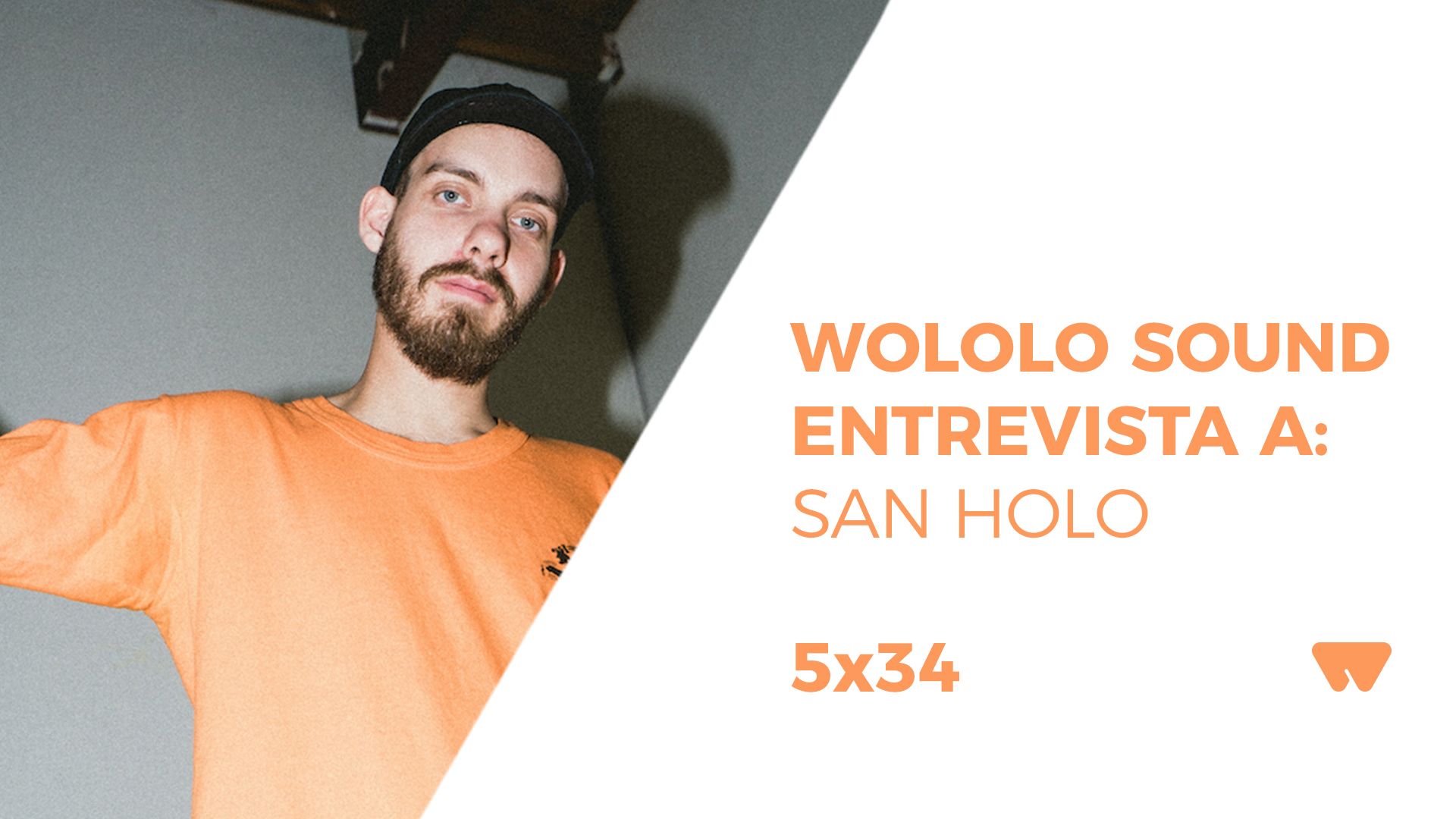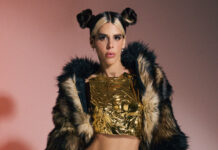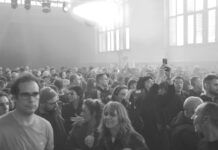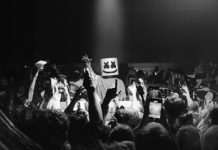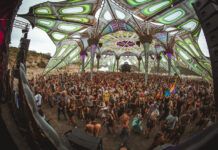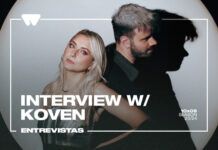Viajamos a Toulouse, Francia, para presenciar uno de los directos más codiciados en el panorama electrónico actual. En una pequeña sala de conciertos llamada Le Rex, nos encontramos con Sander van Dijck, más conocido por su alias artístico San Holo. Disfrutando de un verdadero croissant francés y acomodados en un pequeño camerino en el que el holandés se hallaba relajándose sin despegarse de su guitarra, mantuvimos esta distendida, informal y personal charla con el artista holandés horas antes del aclamado live de su ‘album1‘ entre fortuitos acordes.
Wololo Sound: Antes que nada San, encantado de conocerte.
San Holo: ¡Encantado de conocerte!
Wololo Sound: So first of all, San, nice to meet you!
San Holo: Nice to meet you!
WS: Te encuentras inmerso en la gira de tu nuevo álbum llamado ‘album1‘. ¿Cómo está yendo hasta ahora?
SH: Bien, el año pasado giramos por América durante dos meses y después un mes por Australia. Luego tuve un pequeño parón de dos semanas y ya después empezamos en Europa y ahora estamos en la mitad de la gira Europea. Tenemos dos shows en Francia (Toulouse y Paris) y en las próximas dos semanas seguiremos por Europa y acabaré este “tour” en mi país natal, Holanda. Tengo un show en Ámsterdam y luego, dos días después me voy en seguida de nuevo a América para otro mes de gira. Entretanto, intento hacer música, pero ya sabes que es complicado a veces.
WS: You’re here because you’re in the middle of the ‘album1‘ Tour. How is it going so far?
SH: Good, I mean, last year we toured America for two months and then I had Australia for a month and then I had a little break of couple of weeks, then we started Europe and we’re now halfway. We’ve two shows in France (Toulouse and Paris) and next two weeks we’re still in Europe and I’m finishing this tour in my hometown, Holland. I have a show in Amsterdam and then, two days after I go straight away to America for another month of tour. In the meantime, I try to make music but you know it’s hard sometimes.
WS: ¿Encuentras muchas diferencias entre públicos alrededor del mundo?
SH: Oh, hay mucha diferencia. América es una locura, a los americanos les gusta desmadrarse, ya sabes. Pero me gusta, si les está gustando, lo darán todo, sin descansos. Si les encanta, conducirán ocho horas para verte, ¿sabes? Me gusta mucho eso. Europa es un poco más… uhm… he estado girando por América durante 5 años así, con shows más grandes y acabamos de empezar a hacer eso ahora en Europa este año, sabes. Este tipo de shows con mi propia producción y mis propias luces y mi propia infraestructura. Siento que Europa es más… Primero tienen que aprender sobre ello y “probarlo” un poco y luego, si les gusta, entonces vendrán predispuestos para ello. Pero los americanos son muchísimo más fáciles de impresionar, sabes. Si estás en el escenario, eres especial. Aquí nos cuesta más confiar en alguien, ¿sabes? Dicen “Ok, muéstrame lo que sabes hacer”, “Ok, esto mola. Ahora iremos a verte en concierto”.
WS: And how do you find the difference between crowds around the world?
SH: Oh, there’s so much difference. America it’s really crazy, Americans they like to go crazy, you know. But I like it, if they’re into it, they will just give themselves to it fully, no brakes. If they love it, they would just drive for eight hours to see you, you know? I like that a lot. Europe is a little bit more… uhm…so, I’ve been touring America for five years like this, you know, like bigger shows and we only started to do that in Europe this year, you know. These kind of shows with my own production and my own lights and my own set-up. I feel like Europe is a little bit more… First they have to to kind of learn about it and “taste” it a little bit and then if they like it, then they will come warm for it. But Americans are way easier to be impressed, you know. If you’re on stage, you’re special. Here it’s more like, you know, takes us time to trust someone, you know? They say “Ok show me what you’ve got”, “Ok, this is cool. Now we’re gonna go through a show.”
WS: Hablemos de bitbird, tu propio sello. A bitbird le va bien, estáis lanzando música casi cada semana o cada par de semanas. Droeloe, Taska Black y tú sois las caras principales del sello. ¿Hay algún nuevo fichaje al que deberíamos echarle el ojo o alguno que deberíamos conocer?
SH: Pues la semana que viene… No, la semana que viene no. En abril lanzamos una compilación, ‘Gouldian Finch 3’, y tendremos un montón de buenos artistas ahí. Para mí, deberíais prestar atención a Duskus también. Duskus es un gran artista, Eastghost va a lanzar algo muy grande pronto en bitbird también. Y de hecho sí, para la gente que no conoce bitbird, me gustaría que fueran escuchando nuestras canciones y que sintieran su vibra. Es un rollo muy bitbird. Eso es todo lo que intentamos hacer, no creemos en los géneros. Lanzamos música clásica, lanzamos música pop, lanzamos música trap. Vale cualquier cosa siempre y cuando lo sintamos, ¿sabes? Nuestras canciones tienen un sentimiento profundo y me da la impresión de que ahora estamos empezando a crear un público que aprecia todos los tipos de música. Como que a gente está abierta a cosas alocadas, y no quieren oír solamente “temazos”, también les gustan las cosas bonitas. Y esa es nuestro objetivo, el crear un público de amantes de la música al que le gusta todo tipo de música.
WS: Let’s talk about bitbird, your own label. bitbird is going well, you’re releasing music almost every week or every two weeks. Droeloe, Taska Black and you are the main faces of the label. Is there any new signed artist that we should look forward or any other change that we should be concerned about?
SH: So, next week… actually, not next week. In April we’re dropping a compilation, ‘Gouldian Finch 3′ and we’re gonna have like a lot of great artists on there. To me, you should definitely pay attention to Duskus too. Duskus is a really great artist, Eastghost is going to drop something really big soon on bitbird too. And actually yeah, for the people that don’t know bitbird, I would just like really, I would like them just to go through our songs and feel the vibe of it. It’s a very bitbird vibe. That’s all we’re trying to do, we don’t believe in genres, we don’t believe in like… we release classical music, we release pop music, we release trap music. It’s everything as long as we feel it, you know? Our songs have a deep feeling and I feel right now we’re really starting to create like a crowd, that’s really appreciated for all kinds of music, you know? Like people just really open to crazy stuff, and not just wanna hear the “bangers”, they also like the beautiful stuff, you know? And that’s our goal, to create a crowd of musical lovers that love all source of music.
WS: Buena respuesta. Llevas haciendo música electrónica desde hace ya unos años y hay gente que durante mucho tiempo ha etiquetado tu música como future bass. ¿Cómo ves el género ahora mismo?
SH: Quiero decir, future bass… No pienso que a los artistas les gustara comprometerse a un género. Si te paras a pensar en el pasado, bandas de rock como AC/DC o como Led Zeppelin, ¿piensas que empezaron haciendo música diciendo “vamos a hacer rock clásico”? No, únicamente había rock y luego ya se convirtió en rock clásico. Lo mismo pasa con el future bass. A mi personalmente, al principio me gustó el nombre de future bass, porque… para mi esto no iba sobre un sonido, iba sobre el futuro, sobre el future bass. Y eso no significaba que que tenía que hacer o esto o lo otro para hacerlo sonar tal y cómo se conocía. Eran unas cosas extrañas, nuevas, innovadoras, futuristas. Cosas, como sonidos que impresionen como: “wow, nunca antes había escuchado esto”. Y eso, para mí es de lo que se trata. El future bass es una mentalidad, no solo un género. Es crear algo que no ha estado antes ahí y que sorprenda al oyente. Y creo que es lo que sigo haciendo.
Si me preguntas si aún sigo haciendo future bass, te diría que sí, en mi cabeza sí. Pero como género, no. Porque si se convirtiera en género ahora, como sintetizadores, cajas 808 y ondas… eso no es para mí future bass. El future bass consiste en ser libre en tu mentalidad y crear algo que es nuevo. Música electrónica, en definitiva. Tiene que seguir siendo música electrónica. Creo que es lo único que sigue siendo para mí: música electrónica nueva y rara. Melódica también, creo. Siempre melódica *toca algunos acordes de ejemplo con la guitarra*. Siempre son acordes, melodías diferentes.
WS: Good answer. You’ve been doing electronic music for a while now, and there’s a some people that for a long time have tagged your music as future bass, so how do you feel about the genre right now?
SH: I mean, future bass… I don’t think artists liked to pinned down to a box or to a genre. If you think about the past, rock bands like AC/DC or like Led Zeppelin, do you think they started making music saying “let’s make classic rock”? No, there was just rock music and then it became classic rock. And the same it’s with future bass. To me, future bass I liked the name first, because I was… to me was not about a sound, it was about the future, the future bass music. And that didn’t mean you had to do this or that to make it sound like if you knew it. It was weird stuff, new stuff, innovative stuff, futuristic stuff. Things that, like sounds that blow your mind like: “wow I’ve never heard this before”. And that’s, to me, what it is. Future bass is a mindset, not just a genre. It’s about creating something that’s not there before and that would surprise the listener. And I think that is what I’m still doing.
If you ask me if I’m still making future bass, I would say yes, in my head I am. But as a genre, no. Like because if it became a genre now, like synths, 808 snares and waves… that’s not future bass to me. Future bass is being free in your mind and creating something that’s new. Electronic music, though. It still has to be electronic music. I think that’s the only thing that it is to me: weird-new electronic music. Melodic as well, I think. So also always melodic *plays some chord examples with the guitar*. It’s always like chords, different melodies.
WS: Entonces, por lo que al terreno de la producción se refiere, ¿cómo empiezas una canción?
SH: Depende. Casi siempre me inspiro por sonidos. Solía escribir un montón basándome en escuchar un sonido y luego grabándolo y haciendo acordes o construyendo acordes sobre ése sonido, encontrando mi propios acordes. Un sonido inspira otro sonido que éste inspira a su vez a otro sonido y luego “¡hey, esto suena como un estribillo!” y luego hago el verso, entonces va realmente sobre inspirarse a través de sonidos. Últimamente, me encanta coger la guitarra y tocar algunos acordes y escribir la letra primero. Entonces, probablemente para mi próximo trabajo primero escribiré la letra y luego haré la música. Es algo diferente. Pero en verdad es una combinación de todo. Realmente no sé cómo lo hago, simplemente sucede. Cada vez vas mejorando en ello, creo que vas siendo mejor con el tiempo, sí, no hay una fórmula de oro para ello. Es simplemente la vida y estar inspirado por cosas.
WS: So when it comes up to producing, how do you start a song?
SH: Depends. It’s really most of the time I just get inspired by sounds. I used to write a lot just based on hearing a sound and then recording it and then making chords or building chords around it, finding my own chord sounds. So a sound inspires a sound that inspires a sound that inspires a sound and then “hey, this sounds like a chorus!” and then I make the verse, so it’s really about inspiration of sounds like. Lately, I’ve been more into like grabbing the guitar and just playing some chords and writing the lyrics first. So maybe for my next work I’m first writing the lyrics and then I’ll make the music. That’s kind of different. But it’s a combination of anything. I don’t really know how I do it, it just happens. Eventually you get better at it, I do really believe that you get better at it sometimes, yeah, there’s not a golden formula to it. It’s just life and being inspired by things.
WS: Sobre tu último tema, ‘Lead Me Back‘, confesaste que es uno de tus trabajos más personales hasta la fecha. ¿Qué puedes desvelarnos sobre el tema? ¿Podemos esperar más de esto en cierto punto?
SH: Sí. Es un buen ejemplo de una canción dónde escribí la letra primero y luego la música. Cogí una guitarra acústica, y es simplemente una canción sobre el amor y sobre relaciones y pienso que sobre algo que todos experimentamos: cuando estamos juntos, y todo es maravilloso y luego de repente, ambos cambiáis y tú te quedas cómo: “sabes que no va a funcionar” y mientes para volver atrás al momento en el que os conocisteis por primera vez, pero sabes que no es posible, pero aún sientes que lo quieres. Y, sí, me refiero, ¿esta canción es para ti future bass? ¿Te suena a future bass?
WS: About your last track, ‘Lead Me Back‘, you confessed that it is one of your most personal works to date. What can you tell us about the track? Can we expect more of this at some point?
SH: Yeah. That’s a good example of a song where I wrote the lyrics first and then the music behind it. I borrowed an acoustic guitar and it’s just a song about love and about relationships and I think something that we all experience: when you’re together, and everything is nice and then, at some point, you grow apart or you both change and you’re kind of “ you know it’s not gonna work anymore” and you’re lying to go back to the time when you first met, but you know that’s not possible, but you still have this feeling that you want that. And, yeah, I mean that song is that future bass to you? Does it sound like future bass?
WS: Personalmente, te clasifico como un artista indie-electrónico, me refiero que tiene ese toque future bass a causa de , los impactos, el contraste,… Pero en esta es más como un acústico-indie para mí. Esa es mi opinión.
SH: Sí, está bien. Para mí es lo mismo que he estado haciendo todo este tiempo. Intentar hacer algo nuevo, ¿sabes?. Si quisiera lanzar otra canción que se pareciera exactamente o sonara exactamente a ‘Light’, no tendría sentido porque ya la he hecho, ¿sabes?
WS: Personally, I tag you as an indie-electronic artist, so I mean it has that future bass vibe because of the main leads, the impacts, the contrast,… But in this one it’s more like an acoustic-indie for me. That’s my opinion.
SH: Yeah, that’s great. To me, it’s the same thing I’ve been doing all the time. Just trying to make something new, you know?. If I would release another song that looks exactly like or sounds exactly like ‘Light’, it doesn’t make sense because I’ve already done that, you know?
WS: Adivino que te han pedido hacerlo bastante…
SH: ¡Sí! La gente espera eso de ti, pero creo que es lo guay de bitbird. Creo que hemos creado un aprecio por la innovación. Hemos creado nuestro conjunto de fans para los oyentes y para nosotros también. Es algo recíproco. Ellos esperan de nosotros que vengamos con nuevo material. Si hago la misma canción cinco veces, como creo que mucha gente está haciendo, nuestros fans estarían como: “esto es lo mismo, ¿Dónde está la innovación?; ¿Dónde está el romper con los límites? Hagámoslo de nuevo”. Entonces, eso es muy bueno. Tenía mucho miedo de lanzar ‘Lead Me Back’ porque era toda una canción acústica, pero todo el mundo le ha encantado y para mí fue el single en el que dije “wow, esto es algo especial. La gente no solo está escuchando future bass o EDM, están escuchando música”, eso es lo que adoro.
WS: I can guess you’ve been asked to do that a lot…
SH: Yeah! People expect that of you, but I think that’s the cool thing about bitbird. I think we’ve created some appreciation for innovation. We’ve created our fanbase for listeners and for us too. Goes both ways. They expect us to come up with new stuff. If I make the same song five times, which I believe a lot of people are doing, our fans would be like: “this is the same, where’s the innovation?; Where’s breaking boundaries? Let’s do that again”. So, that’s really great. I was very scared to release ‘Lead Me Back’ because it was such an acoustic song, but everyone it’s been really crazy about it and to me, it was the single like “wow, this is something special. People are just not listening to future bass or EDM, they just listening to music”, that’s what I love.
WS: Y hablando de la composición, ¿Podemos esperar un segundo álbum después de esta experiencia con ‘album1‘?
SH: Sí, desde que saqué ‘album1’ recibí un montón de mensajes de gente diciendo lo mucho que le ha impactado el disco en sus vidas y lo mucho que , sabes? Aún así, lo escuchan y si tienen un mal día, se lo ponen. ¿Tú también? ¡Es genial! Esto es parecido a lo que he tenido antes con algunos otros singles como ‘Light’, por supuesto. Pero este álbum es mucho más grande que eso. Y no puedo esperar a hacer algo más, algo nuevo otra vez. ¡Tengo muchísimas ganas de hacer algo nuevo otra vez!
WS: And talking about composition, can we expect like another second album after this experience of ‘album1‘?
SH: Yeah, ever since I released ‘album1’ I just got so many messages of people saying like how much impacted their life and how much they still get out of it, you know? They still listen to it, if they had a bad day, they put it on. You too? That’s great! And that’s like I’ve had that before with some singles like ‘Light’, of course. But this album feels so much bigger than that. And I can’t wait to do something else, something new again. I’m really excited to do something new again!
WS: Para el próximo, ¿la motivación sería hacer sentir a la gente de esa manera o…?
SH: Bien, lo más bonito sobre la música para mí es, como creador, es mi habilidad de hacer algo que es mío propio, en mi propio camino. No quiero hacer algo que suene demasiado a esto o se compare a esto otro, pero para la gente siento que es maravilloso cuando alguien me dice: “Hey, esta canción la escuché cuando fui de vacaciones con mis padres y aún me acuerdo de ese momento, fue realmente maravilloso y esa canción me recuerda a ello”. Vincular el recuerdo a una canción, eso es lo que la gente está haciendo cuando están escuchándola. Cuando van a un show o a un festival y escuchan las canciones están cómo “Nunca olvidaré este momento” y luego tu pasas a formar parte de sus vidas de alguna manera, y eso es maravilloso.
WS: So for the next one, the motivation would be to make people feel this way or there’s…?
SH: Well, the most beautiful thing about music to me is, as a creator myself, is my ability to make something that’s my own, in my own lane. I don’t want to make something that sounds too much like that or compares to that, but for the people I feel like it’s so beautiful to me if someone says: “Yo, that song I’ve listened to that when I went on holiday with my parents and I still think about that time, and it was such a beautiful time and that song reminds me of it”. To link the memory to a song and that’s what people are doing when they’re listening. When they go to a show or to a festival and they hear the songs they’re like: “I would never forget this moment” and then you become part of their lives in a way, and that’s beautiful.
WS: Por último, ¿qué te parece España? Sabemos que has experimentado antes lo que es estar en nuestro país.
SH: ¿Sobre España? Uno de los primeros lugares que visité fue Benidorm, fui cuando era un crío de vacaciones con mis padres, mi abuela y mi abuelo. Fue muy divertido. Me encantó. No he tenido muchos shows en España, debería hacer más. Me encantaría hacer un show con mi propia producción, cómo el que estoy haciendo esta noche en Francia, ¿sabes? Siento que… Me encanta Barcelona, amo ir allí. Creo que, ¿he tocado allí en Razzamatazz? Toqué en un sitio realmente pequeño en la sala Razzmatazz, en la sala pequeña, debajo de la escalera hice un DJ set. Después, salimos a la calle, caminando tranquilamente y había un muy buen ambiente. Era como si la gente tuviera realmente muchísimas ganas de fiesta, verdad? Me gustó. Me acuerdo de… La comida es increíble, sí, me encantaría actuar allí más.
WS: Last but not least, what do you think about Spain? You’ve experienced that before.
SH: About Spain? Well, one of the first place I went was Benidorm, I went as a kid for holiday with my parents and my grandma and my grandpa. It was really fun. I loved it so much. I haven’t played too many shows in Spain, I should do more. I would love to do a show there with my own production, with like the one I’m doing tonight in France, you know? I feel like… I love Barcelona, I love going there. I think I’ve played at Razzmatazz? I played in a really small place in Razzmatazz, the small room, under the staircase, I did a DJ set. And afterwards, we went out on the streets, just walking around and man, there was such a great vibe. It’s like a really people party there in Barcelona, right? I liked it. I remember… Food is amazing, yeah I would love to play there more.
WS: Preguntas rápidas:
– Comida favorita
SH: Comida thai.
– Ciudad favorita del mundo
SH: La Haya, en Holanda. No, no es verdad. Los Angeles. Aargh… Los Angeles, sí… O Austin, Texas… Austin, ¡LOS ANGELES! No, Austin Texas, Austin, Texas… No puedo responder, demasiados sitios bonitos.
– Tu show favorito
SH: Shrine en LA, 5.000 people, sold out. También en Nueva York, Terminal también fue precioso.
– Artista con el que te gustaría colaborar
SH: Me gustaría trabajar con… ¿Conoces a Sigur Ros? Voy a apoyar a este chico. Conoces… ¿Ves? Todos estos grupos… ¿Conoces a A. G. Cook? Tanta gente. Honestamente, estoy trabajando mucho por mi cuenta. Ahora mismo me gusta hacer lo mío. Petit Biscuit alomejor.
– Palabra española favorita
SH: Conozco “sí”. Mi palabra favorita es “sí” y “¿Cómo estás?”
WS: Fast questions:
– Favorite food
SH: Thai food.
– Favorite city in the world
SH: The Hage, in the Netherlands. No, it’s not true. Los Angeles. Aargh… Los Angeles, yeah… Or Austin, Texas… Austin, LOS ANGELES! No, Austin Texas, Austin, Texas… I cannot answer, too many beautiful places.
– Favorite show of yours
SH: Shrine In LA, 5.000 people, sold out. Also in New York, Terminal was also beautiful.
– Artist you’d like to collab with
SH: I’d like to collab with… Do you know Sigur Ros? Exposing this guy. Do you know… You see? All these bands you know… Do you know A. G. Cook? So many people. Honestly, I’m working on a lot of things myself. I like doing my own thing for now. Petit Biscuit, maybe.
– Favourite Spanish word
SH: I know “sí”, that is yes. My favorite word is “sí” and “¿Cómo estás?”.
WS: Eso ha sido todo, muchísimas gracias por atendernos Sander.
SH: ¿Ya está? ¡Gracias!
WS: That’s it. Thank you, Sam!
SH: Yeah, we good? Thank you!


